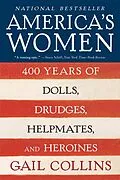Spanning four centuries of history, America's Women describes the way women's lives have been altered by medical advances, social theories about sex and courtship, and ever-changing attitudes toward education, work, and politics. Gail Collins, the editorial page editor at the New York Times, chronicles not only the lives of the famous, but also those of everyday women - their families, careers and personal choices.
From contraception to corsets, and from equal rights to the tyranny of fashion, Collins relates the compelling, heartbreaking, funny and inspirational history of women as they made lives for themselves and their families in a new world. Gail Collins is the Editor of the Editorial Page at the New York Times - the first woman to hold this position. Before that, she wrote the "Public Interest" column for paper's Op-Ed page, was a member of the editorial board, and was a columnist for The New York Daily News and New York Newsday. She is the author of Scorpion Tongues: Gossip, Celebrity and American Politics. "Gail Collins's book is the best survey of American women's history we have. It is a rich and absorbing story, carried along by humor, deep feeling, and superb historical intelligence." - Christine Stansell, professor of history, Princeton University, and author of American ModernsAutorentext
Gail Collins, a columnist for the New York Times, was the the first woman ever to serve as editorial page editor for the paper. Previously, she was a member of the Times editorial board, and a columnist for the New York Daily News and New York Newsday.
Klappentext
Rich in detail, filled with fascinating characters, and panoramic in its sweep, this magnificent, comprehensive work tells for the first time the complete story of the American woman from the Pilgrims to the 21st-century
In this sweeping cultural history, Gail Collins explores the transformations, victories, and tragedies of women in America over the past 300 years. As she traces the role of females from their arrival on the Mayflower through the 19th century to the feminist movement of the 1970s and today, she demonstrates a boomerang pattern of participation and retreat.
In some periods, women were expected to work in the fields and behind the barricades-to colonize the nation, pioneer the West, and run the defense industries of World War II. In the decades between, economic forces and cultural attitudes shunted them back into the home, confining them to the role of moral beacon and domestic goddess. Told chronologically through the compelling true stories of individuals whose lives, linked together, provide a complete picture of the American woman's experience, Untitled is a landmark work and major contribution for us all.
